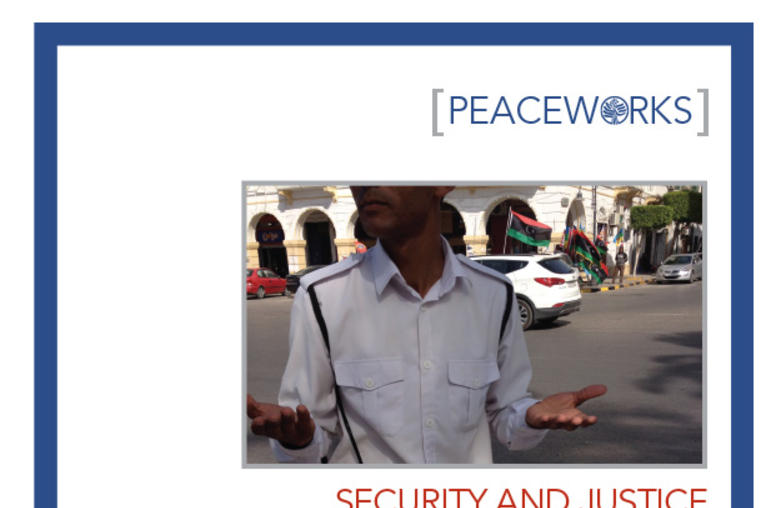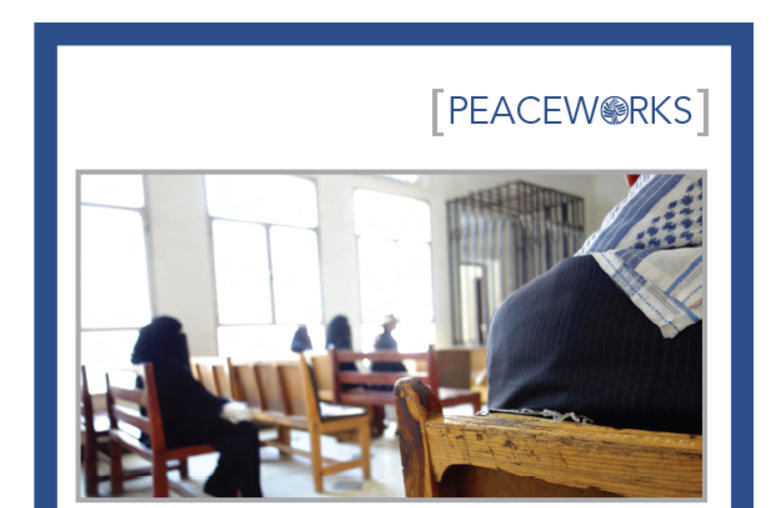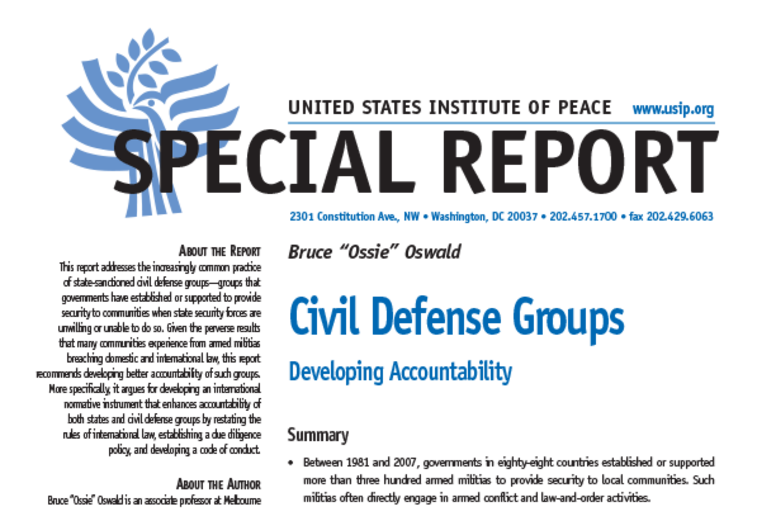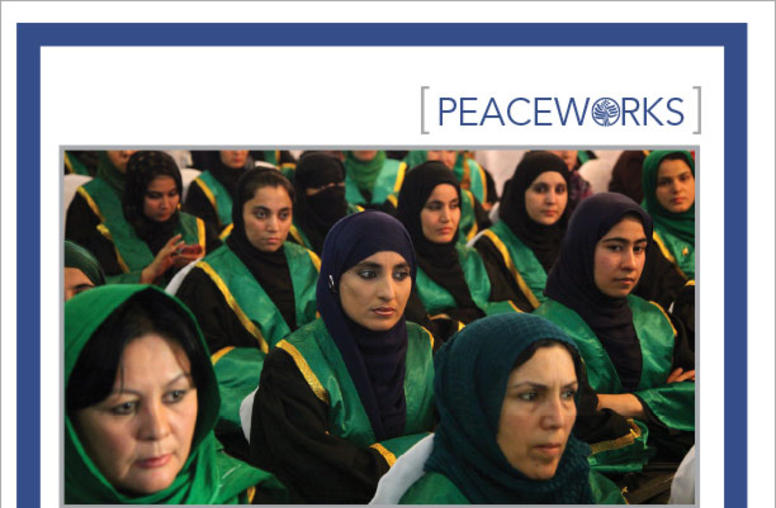Temporary Courts, Permanent Records
Temporary international criminal courts create voluminous records of lasting significance to victims, scholars, and legal practictioners—arrangements must be made for their permanent protection, storage, and use.
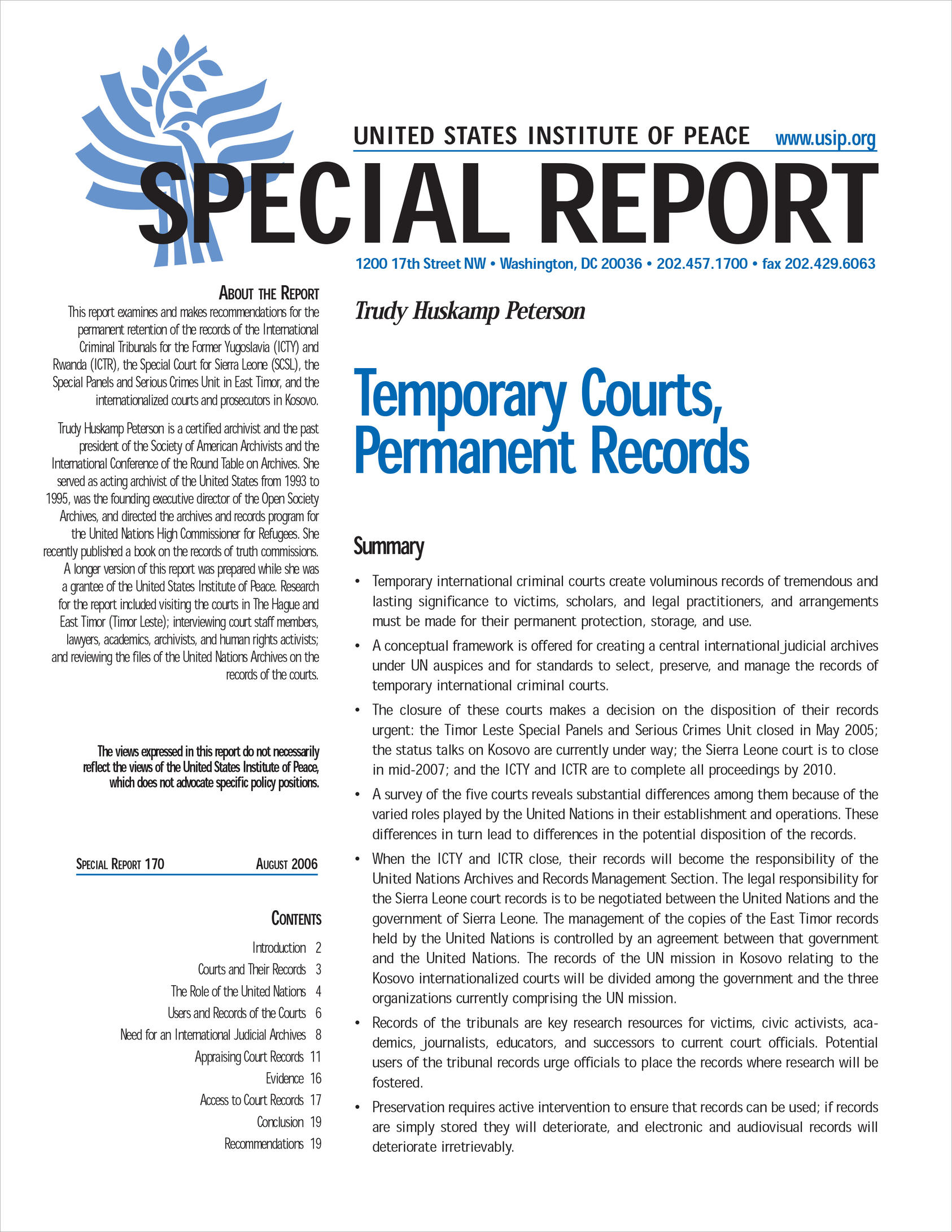
Summary
- Temporary international criminal courts create voluminous records of tremendous and lasting significance to victims, scholars, and legal practitioners, and arrangements must be made for their permanent protection, storage, and use.
- A conceptual framework is offered for creating a central international judicial archives under UN auspices and for standards to select, preserve, and manage the records of temporary international criminal courts.
- The closure of these courts makes a decision on the disposition of their records urgent: the Timor Leste Special Panels and Serious Crimes Unit closed in May 2005; the status talks on Kosovo are currently under way; the Sierra Leone court is to close in mid-2007; and the ICTY and ICTR are to complete all proceedings by 2010.
- A survey of the five courts reveals substantial differences among them because of the varied roles played by the United Nations in their establishment and operations. These differences in turn lead to differences in the potential disposition of the records.
- When the ICTY and ICTR close, their records will become the responsibility of the United Nations Archives and Records Management Section. The legal responsibility for the Sierra Leone court records is to be negotiated between the United Nations and the government of Sierra Leone. The management of the copies of the East Timor records held by the United Nations is controlled by an agreement between that government and the United Nations. The records of the UN mission in Kosovo relating to the Kosovo internationalized courts will be divided among the government and the three organizations currently comprising the UN mission.
- Records of the tribunals are key research resources for victims, civic activists, academics, journalists, educators, and successors to current court officials. Potential users of the tribunal records urge officials to place the records where research will be fostered.
- Preservation requires active intervention to ensure that records can be used; if records are simply stored they will deteriorate, and electronic and audiovisual records will deteriorate irretrievably.
- The ICTY, ICTR, and the Special Court for Sierra Leone must establish basic access rules for their records before closing; they should make every attempt to harmonize their access provisions.
- The United Nations should explore constructing and staffing an international judicial archives in The Hague and should begin providing copies of publicly available court records to institutions in the countries affected by the court proceedings. Governments and donors should actively encourage and support the United Nations in these efforts.
Introduction
International criminal courts and tribunals are a distinctive development of the 1990s. At the start of that decade, no international criminal courts existed. Today, three independent international bodies adjudicate international criminal law: the International Criminal Tribunal for the Former Yugoslavia (ICTY), established in 1993; the International Criminal Tribunal for Rwanda (ICTR), established in 1994; and the International Criminal Court (ICC), created by a treaty concluded in 1998. Internationalized or "hybrid" criminal courts also exist, employing both national and foreign personnel. Hybrid war crime courts currently operate in UN-administered Kosovo, Sierra Leone (the Special Court for Sierra Leone, 2001), and Bosnia (the War Crimes Chamber, 2004) and operated between 2000 and 2005 in East Timor (the Special Panel for Serious Crimes of the Dili District Court and the deputy prosecutor for serious crimes). A hybrid court is being established in Cambodia and others may be created in Burundi and Afghanistan. With the exception of the ICC, these bodies were intended at their creation to have limited life spans.
This report provides a conceptual framework for creation of an international judicial archives that could house and preserve the records of these historically significant institutions and the standards for managing these records. It looks at five explicitly temporary courts: the East Timor Special Panels and Serious Crimes Unit, which closed in May 2005; the internationalized courts in Kosovo, where status talks that are likely to lead to the closure of the United Nations' mission there are presently under way; the Special Court for Sierra Leone, which is to close in mid-2007; and the ICTY and ICTR, which are to complete all proceedings by 2010. The need to establish a preservation and access strategy for the records of these courts is urgent.
The United Nations established all five of these diverse courts, and it is responsible for the preservation of some or all of their records. The records of the ICTY and ICTR are records of the United Nations per se and, like records of governments, they are inalienable. Together with such records of the other courts as come into UN custody, they form an historically important, sensitive body of records that the United Nations has a duty to preserve and make available in scrupulous good faith. The United Nations is entrusted to find a secure location for the preservation and use of these records after the courts close, and it must begin planning now to fulfill its archival responsibilities. Governments such as that of the United States, which played a central role in bringing these courts into existence, as well as those whose citizens have the primary stakes in the courts' work, should actively support and encourage the United Nations' efforts.
The urgent need to preserve and protect these records is illustrated forcefully by recent events in East Timor. The riots of May 2006 in the capital, Dili, led to the loss of at least some of the records assembled by the Serious Crimes Unit to prosecute those responsible for the country's devastation in 1999. Whether the looters targeted the records for destruction or whether they were merely looting is irrelevant: the databases are lost and some of the paper records are gone. Fortunately, the United Nations Security Council had required that a copy of the records of the Serious Crimes Unit be made, and that was done in the spring and summer of 2005. Without that copy in the hands of the United Nations, crucial evidence would be irretrievably lost. Preserving the copy, in a safe location with sound access controls, is of the utmost importance.
Conclusion
The East Timor Special Panels and the Serious Crimes Unit have closed; the Special Court for Sierra Leone is to close in mid-2007; final status talks on Kosovo are underway; and ICTR and ICTY have fixed closures in 2010. Given how long it takes to prepare appropriate archival facilities for storing sensitive records, now is the time to determine what will happen to the records of these bodies.
Operating a judicial archives is a serious business. It is the inevitable outcome of the historic establishment of UN war crimes tribunals. As organizations operate, they create records. Historically important organizations create records of historic significance. The international community has no choice: the records of the temporary international criminal courts must be preserved and protected and made available. The point of saving the records is to permit them to be used--used today for their primary purposes, used tomorrow for a range of research that we cannot even imagine. The goal is clear. As former ICTY prosecutor Louise Arbour wrote, "If we exploit the full potential of criminal trials for war crimes, we should do so in part to punish, in part to deter, but, most importantly, to try to understand." Archives--the permanently valuable records of the international judicial process--make that understanding possible.
Recommendations
The United Nations and the temporary courts should initiate several programs in the short term to lay the foundation for a central judicial archives to preserve the courts' records, conserve resources, and provide access to researchers and the general public.
- Role of the United Nations: The United Nations should establish a single international judicial archives for the permanently valuable records (paper files, audio and video recordings, electronic records, and objects) of the temporary tribunals, including the ICTY, the ICTR, the Special Court for Sierra Leone, and the UN copies from the Special Panels and Serious Crimes Unit in Timor Leste.
- Role of the United States and other governments: Governments such as the United States that played a central role in creating and funding the temporary courts, and governments whose citizens have the primary stake in the courts' work, should actively encourage and support a UN effort to properly preserve and make available for use the records of the temporary courts.
- Location: The United Nations should discuss with the city of The Hague, the government of The Netherlands, and the Dutch Carnegie Foundation the possibility of locating an international judicial archives in The Hague. The United Nations should also begin to canvas international donors, both governments and nongovernmental institutions, to evaluate the level of resources that might be available for construction and, critically, continued staffing and maintenance of the archival program.
- Duplication program: Meanwhile, the United Nations should plan a program of copying and describing that will meet research needs in the countries affected. This program can begin immediately and would provide an opportunity for the United Nations to work cooperatively with institutions in the regions.
- Personal papers: The courts should adopt clear guidelines to differentiate between institutional court records and personal papers that judges and staff members may take upon leaving the court or its closure. The UN archives should be given the authority to solicit personal papers and other relevant materials from the private sector.
- Record destruction and public notice: Some records of the courts are permanently valuable and some, primarily housekeeping records, can be destroyed. Ample public notice should be provided of all records proposed for destruction to allow the public to comment on the proposals.
- Access policy: The ICTY, ICTR, and SCSL must establish basic access rules for their records before closing; they should make every attempt to harmonize their access provisions. The access policy must balance the public's right to know about the courts' activities and the right of defendants, victims, witnesses, and court personnel to protect information about themselves from potentially harmful public disclosure.
- Artifacts for use in exhibits: The objects and artifacts maintained by a tribunal, if not returned to a family, should be retained by the archives and made available for loan to institutions for exhibits and educational programs.
About the Report
This report examines and makes recommendations for the permanent retention of the records of the International Criminal Tribunals for the Former Yugoslavia (ICTY) and Rwanda (ICTR), the Special Court for Sierra Leone (SCSL), the Special Panels and Serious Crimes Unit in East Timor, and the internationalized courts and prosecutors in Kosovo.
Trudy Huskamp Peterson is a certified archivist and the past president of the Society of American Archivists and the International Conference of the Round Table on Archives. She served as acting archivist of the United States from 1993 to 1995, was the founding executive director of the Open Society Archives, and directed the archives and records program for the United Nations High Commissioner for Refugees. She recently published a book on the records of truth commissions. A longer version of this report was prepared while she was a grantee of the United States Institute of Peace. Research for the report included visiting the courts in The Hague and East Timor (Timor Leste); interviewing court staff members, lawyers, academics, archivists, and human rights activists; and reviewing the files of the United Nations Archives on the records of the courts.
